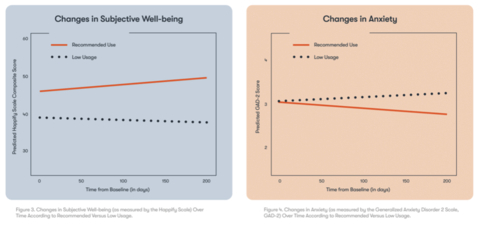Happify Health Research Shows Impact of Digital Interventions to Improve Anxiety Symptoms & Well-Being in Psoriasis Patients
Happify Health Research Shows Impact of Digital Interventions to Improve Anxiety Symptoms & Well-Being in Psoriasis Patients
- A real-world data analysis exploring the impact of Happify for users with self-reported psoriasis found that people with psoriasis who completed 16 activities within a minimum of six weeks showed a 27% reduction in anxiety symptoms and a 27% increase in subjective well-being
- Psoriasis is an immune-mediated disease that costs the U.S. healthcare system approximately $112 billion each year1
- Psoriasis affects 125 million people worldwide, 7.5 million adults over 20 in the U.S.1
- 33% of psoriasis patients have at least mild anxiety and 21% have at least moderate anxiety2
- Comorbidities account for approximately $36.4 billion of the costs associated with psoriasis3
NEW YORK--(BUSINESS WIRE)--Today, Happify Health (www.HappifyHealth.com), the Intelligent Healing Company, announced findings from a real-world data analysis exploring the impact of Happify for users with self-reported psoriasis. Psoriasis affects 125 million people worldwide, making it a “serious global problem” according to the World Health Organization. In the U.S., 7.5 million adults over age 20 have the condition, costing the U.S. healthcare system approximately $112 billion each year1.
Details of Happify Health’s real-world data analysis are available online.
The analysis found Happify Health’s solution was associated with a 27% improvement in subjective well-being and a 27% decrease in anxiety symptoms, which have been identified as a trigger for psoriasis symptoms4. Greater improvements were found among those who engaged with Happify at recommended levels.
“Psoriasis may be a physical condition, but because scaling is so apparent, and the perceived stigma often leads to feelings of embarrassment, shame, low self-esteem, and self-consciousness, it’s no surprise that people experience anxiety and impaired well-being,” said Murray Zucker, MD, Chief Medical Officer at Happify Health. “This new analysis is important because it suggests that digital interventions like Happify Health can have a significant—and positive impact—on those suffering with psoriasis and should be a part of any psoriasis care plan.”
Happify researchers analyzed data from 219 Happify users with self-reported psoriasis and examined changes in anxiety symptoms and well-being among the participants based on their usage, as measured by their Happify Score5, a proprietary, clinically-validated, behavioral health assessment.
Summary of Findings
Those who completed 16 or more activities (recommended usage) improved their subjective well-being scores by 26.8%, while those with fewer than 16 completed activities (less than recommended usage) improved their well-being scores by only 4.11%.
Participants in the recommended usage group improved their symptoms of anxiety by 26.64%, while those in the less than recommended usage group improved their scores by 8.15%.
Psoriasis and Mental Health
Psoriasis is associated with several physical comorbidities such as psoriatic arthritis, chronic pulmonary disease, and diabetes that account for approximately $36.4 billion1 of the costs associated with the chronic condition.
Yet high levels of distress also negatively impact mental health, particularly when psoriasis patches are visible. In fact, a recent meta-analysis found that 20% of psoriasis patients had at least mild depressive symptoms and 14% had at least moderate depressive symptoms, whereas 33% had at least mild anxiety and 21% had at least moderate anxiety.
Digital Solutions for Psoriasis Patients
Digital interventions like Happify can help support those with psoriasis and improve their mental health and well-being. Happify Health partners with pharmaceutical companies to reach those in need, increase medication adherence, and improve health outcomes.
About Happify Health
Happify Health is The Intelligent Healing Company™. We shorten the distance between need and care by configuring personalized digital therapeutics and care solutions at scale for the modern healthcare cloud. Our platform integrates AI with empathy, making healing more personal, precise, and connected for the entire care journey. We deploy a full spectrum of clinical-grade care solutions—including Digital Therapeutics, Coaching, Community, and Well-being products—for pharma, health plans, enterprises, and individuals everywhere.
Our global platform is available in 10 languages, supports chronic conditions, and covers more than 20 million lives. For more information, visit HappifyHealth.com.
1 |
Data from the National Psoriasis Foundation (https://www.psoriasis.org/psoriasis-statistics/) |
2 |
Zhao, S. S., Miller, N., Harrison, N., Duffield, S. J., Dey, M., & Goodson, N. J. (2020). Systematic review of mental health comorbidities in psoriatic arthritis. Clinical rheumatology, 39(1), 217-225 |
3 |
Brezinski, E. A., Dhillon, J. S., & Armstrong, A. W. (2015). Economic burden of psoriasis in the United States: a systematic review. JAMA dermatology, 151(6), 651-658. |
4 |
Hall, J. M., Podawiltz, A., Mummert, D. I., Jones, H., & Mummert, M. E. (2012). Psychological stress and the cutaneous immune response: roles of the HPA axis and the sympathetic nervous system in atopic dermatitis and psoriasis. Dermatology research and practice,2012. |
5 |
The Effects of a Digital Well-Being Intervention on Patients With Chronic Conditions: Observational Study (https://www.jmir.org/2020/1/e16211/) |
Contacts
Media Relations Contact:
Nate Purpura
Nate@happify.com
(805) 215-3336
Happify Health Press Contact:
Erin Bocherer
erin@cogentacom.com
(678) 294-2258

